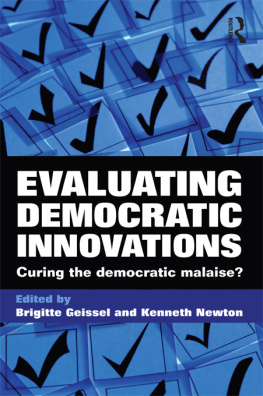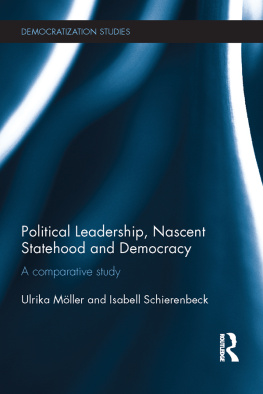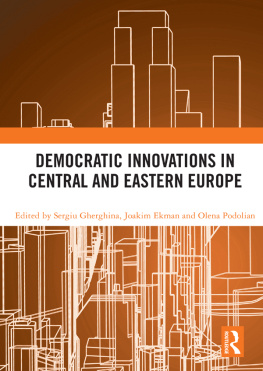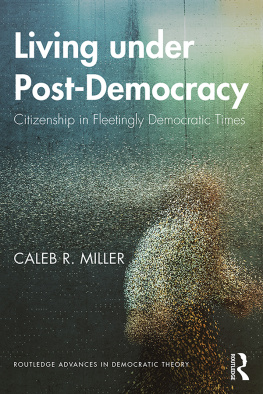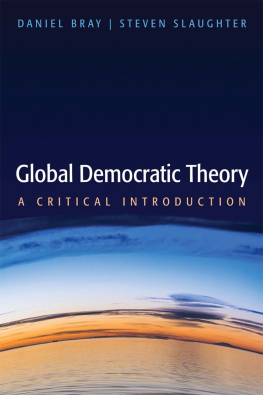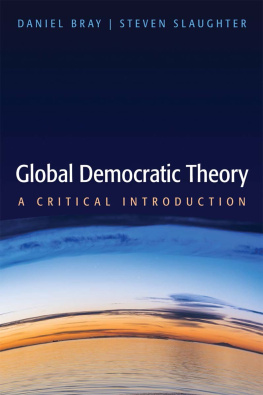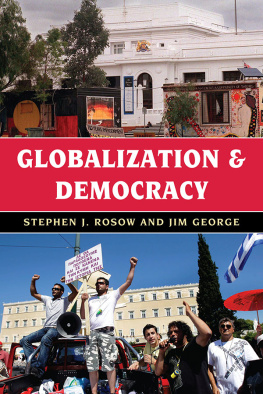Evaluating Democratic Innovations
In the face of increasing political disenchantment, many Western governments have experimented with innovations that aim to enhance the working and quality of democracy as well as increasing citizens political awareness and understanding of political matters.
This text is the most comprehensive account of these various democratic innovations. Written by an outstanding team of international experts it examines the theories behind these democratic innovations, how they have worked in practice and evaluates their success or failure. It explains experiments with new forms of democratic engagement such as:
- direct democracy
- deliberative democracy
- co-governance.
Drawing on a wide variety of theoretical perspectives and with a broad range of case studies, this is essential reading for all students of democratic theory and all those with an interest in how we might revitalise democracy and increase citizen involvement in the political process.
Brigitte Geissel is Professor of Political Sciences and Political Sociology at Goethe University in Frankfurt am Main, Germany, and Ash Center for Democratic Governance and Innovation, Harvard Kennedy School, USA.
Kenneth Newton is Visiting Professor at the Wissenschaftszentrum Berlin and Emeritus Professor of Comparative Politics at the University of Southampton, UK.
Evaluating Democratic Innovations
Curing the democratic malaise?
Edited by Brigitte Geissel and
Kenneth Newton
First published 2012
by Routledge
2 Park Square, Milton Park, Abingdon, Oxon, OX14 4RN
Simultaneously published in the USA and Canada
by Routledge
711 Third Avenue, New York, NY 10017
Routledge is an imprint of the Taylor & Francis Group, an informa business
2012 editorial and selected matter; Brigitte Geissel and Kenneth Newton, contributors their contributions
The right of Brigitte Geissel and Kenneth Newton to be identified as the authors of the editorial material, and of the authors for their individual chapters, has been asserted in accordance with sections 77 and 78 of the Copyright, Designs and Patents Act 1988.
All rights reserved. No part of this book may be reprinted or reproduced or utilised in any form or by any electronic, mechanical, or other means, now known or hereafter invented, including photocopying and recording, or in any information storage or retrieval system, without permission in writing from the publishers.
Trademark notice: Product or corporate names may be trademarks or registered trademarks, and are used only for identification and explanation without intent to infringe.
British Library Cataloguing in Publication Data
A catalogue record for this book is available from the British Library
Library of Congress Cataloging in Publication Data
Evaluating democratic innovations : curing the democratic malaise? / edited
by Brigitte Geissel and Kenneth Newton.
p. cm.
Includes bibliographical references.
1. Direct democracy. 2. Deliberative democracy. 3. Direct
democracyCase studies. 4. Deliberative democracyCase studies
I. Geissel, Brigitte. II. Newton, Kenneth, 1940
JC423.E9 2011
321.8dc23 2011021987
ISBN: 9780415669191 (hbk)
ISBN: 9780415669207 (pbk)
ISBN: 9780203155196 (ebk)
Typeset in Times New Roman
by HWA Text and Data Management, London
Contents
Acknowledgements
|
Introduction
|
KEN NEWTON
|
PART I
New and old forms of (direct) democracy
|
|
IAN BUDGE
|
|
HANSPETER KRIESI
|
|
DAVID BEETHAM
|
PART II
Deliberative democracy
|
|
JAMES S. FISHKIN
|
|
GRAHAM SMITH
|
|
DIETER RUCHT
|
PART III
Comparing innovations
|
|
KEN NEWTON
|
|
BRIGITTE GEISSEL
|
|
JULIEN TALPIN
|
Conclusion
|
BRIGITTE GEISSEL
|
Index
|
Figures and tables
Figures
Tables
Contributors
David Beetham is Professor Emeritus, University of Leeds, and Honorary Fellow, Human Rights Centre, University of Essex. He contributed to the development of the democratic audit methodology used in the UK and internationally, and has acted as consultant to many audits overseas. He has written a guide to good democratic practice for parliaments for the Inter-Parliamentary Union, Geneva, and co-authored a guide to democracy assessment for the International Institute for Democracy and Electoral Assistance, Stockholm. Recent books include Democracy: a Beginners Guide (Oneworld Publications 2005).
Ian Budge is Emeritus Professor in the Department of Government at the University of Essex. He has made major contributions both to cumulative research on democracy and to organizational developments in the discipline. His earliest research on Glasgow and Belfast focused on causes of democratic breakdown. After a period of studying elections, voting behaviour and party competition, he turned to public policy and how it might become responsive to popular preferences a central democratic dilemma. His research covers both direct and representative democracy. He founded the Essex Summer School in Social Science Data Analysis in 1968. He was Executive Director of the European Consortium in Political Research between 1979 and 1983. Among his recent publications are (with Klingemann, Volkens, Bara and Tanenbaum) Mapping Policy Preferences: Estimates for Parties, Electorates and Governments 19451998 (Oxford University Press 2001); (with Michael D. McDonald) Elections, Parties, Democracy: Conferring the Median Mandate (Oxford University Press 2005); and (with David McKay, Kenneth Newton and John Bartle) The New British Politics (Pearsons Education Limited 2007).
James S. Fishkin directs the Center for Deliberative Democracy at Stanford University where he teaches Communication and Political Science. He holds the Janet M. Peck Chair in International Communication at Stanford and is Chair of the Department of Communication. He recently wrote When the People Speak: Deliberative Democracy and Public Consultation (Oxford University Press 2009) as well as a number of earlier books including Democracy and Deliberation (Yale University Press 1991) and The Voice of the People (Yale University Press 1995) and (with Bruce Ackerman) Deliberation Day (Yale University Press 2004). His Deliberative Polling projects have provided a new method of public consultation in countries around the world ranging from the US and Canada to Britain, Italy, Bulgaria, Australia, Hungary, Poland, Brazil, Argentina, China, Thailand, Japan, Northern Ireland, Denmark and European wide. More details can be found at the Center for Deliberative Democracy site, http://cdd.stanford.edu.
Brigitte Geissel , full Professor of Political Science and Political Sociology at Goethe University Frankfurt am Main, held research and teaching positions at various universities/institutes such as Harvard Kennedy School (USA), Social Science Research Center Berlin, Center of Excellence on Democracy at bo Akademi (Finland), the Universities of Mnster, Berlin, and Illinois (USA) as well as the Vietnamese German University, Saigon. Her research interests include democratic innovations, new forms of governance and political actors (new social movements, associations, civil society, parties, political elites, citizens). Recent publications have been published in, for example, Comparative Sociology , West European Politics , European Journal of Political Research .

